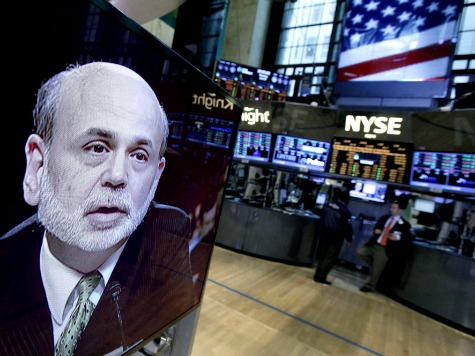
“I’m shocked, shocked to find that gambling is going on in here!”
Claude Raines to Humphrey Bogart
For the past several weeks, financial professionals have listened to a procession of economists predicting that the Federal Reserve would start to end its extraordinary, $85 billion per month in purchases of government and mortgage bonds. Known as “quantitative easing,” the Fed’s bond buying is a Keynesian inspired expedient supposed to boost job growth and consumer income, but has largely failed to deliver in either case.
But Wall Street’s hopes were dashed yesterday. “Fed officials kept the central bank’s $85 billion-per-month bond-buying program in place, saying they wanted to see more evidence the economy can sustain improvement before scaling back,” The Wall Street Journal reported.
Back in August, Brian Wesbury of First Trust Advisors, a usually sober conservative among Wall Street economists, predicted confidently that the Fed would begin “tapering” the central banks purchase of bonds in September. But Wesbury, who worked on Capitol Hill before turning to Wall Street, is hardly alone.
“The good news for investors,” said BlackRock chief investment strategist Russ Koesterich, “is that at this point (tapering) is probably well reflected in the market. It’s going to be a very gradual, light, tapering. I’ll define that somewhere between ten and fifteen billion dollars.”
Koesterich went on to tell Yahoo Finance that he is looking for confirmation from the Fed that we are in a “gradually improving” economic environment. It’s the kind of climate that can withstand higher interest rates, he opined, and the kind of market he thinks favors equities over bonds.
But of course both Wesbury, Koesterich and dozens of other economists were completely (and very publicly) wrong about the Fed’s intentions and the nature of the “economic recovery.” The notion of “tapering” is a sort of hallucination commonly experienced by practicing economists, especially the variety that believe in “soft landings” and other types of neo-Keynesian nonsense. The tapering mirage is part of a larger delusion prevalent on Wall Street that the Federal Open Market Committee alone can engineer an economic rebound.
The first thing to say is that the Fed’s decision is no surprise. Anybody who understands the true concerns of Chairman Bernanke and the FOMC knows that a slack job market and flat to down consumer income are the drivers of policy. The Census Bureau just reported that median household income in the United States in 2012 was $51,017, not statistically different in real terms from the 2011 median of $51,100. This followed two consecutive annual declines.
As we’ve noted in this space, the Fed’s past inflationary policies have brought us to this sad end, but nobody in Washington wants to hear that right now. After decades of accommodating reckless federal deficits with progressively lower interest rates, the FOMC has essentially painted itself into a corner. Fed Chairman Ben Bernanke talks about the need to keep rates low to boost employment, yet his policies are feeding inflation, the steady increase in prices that makes it more and more difficult for private employers to hire workers. The Fed’s QE policy penalizes savers and employers, while feeding tens of billions of dollars in subsidies each year to debtors.
The problem with the Fed’s policies is that they are killing jobs in order to avoid falling prices, the ancient fear of deflation that is a legacy from the 1930s. “The American economy has shed 347,000 jobs over the past two months, roughly comparable with the rate of loss seen during the Great Recession,” writes Ambrose Evans Pritchard in The Telegraph of London. “It is remarkable that the US Federal Reserve should even have been thinking of phasing out life-support in such circumstances.” He continues:
“The shock decision on Wednesday night to put off tapering bond purchases is a recognition of what should have been obvious. Rising mortgage costs and the ‘tightening of financial conditions’ could slow growth, it said. Indeed. The net loss of jobs over the summer months has been entirely among men, mostly aged 25 to 54 and university educated. The cohort aged over 55 has been growing, so this is not happening because baby boomers are retiring early and happy to grow cantaloupes in Arkansas, or to play golf at Torrey Pines.”
So when you read news reports about yesterday’s “surprise” decision by the FOMC, just remember that the only people who were surprised are Wall Street traders and their captive economists. For people who live and work in the real world, job losses and tough economic times more generally are no surprise. But what is really needed from the Fed is the recognition that current monetary policy is just making a bad economic situation in the US worse.

COMMENTS
Please let us know if you're having issues with commenting.